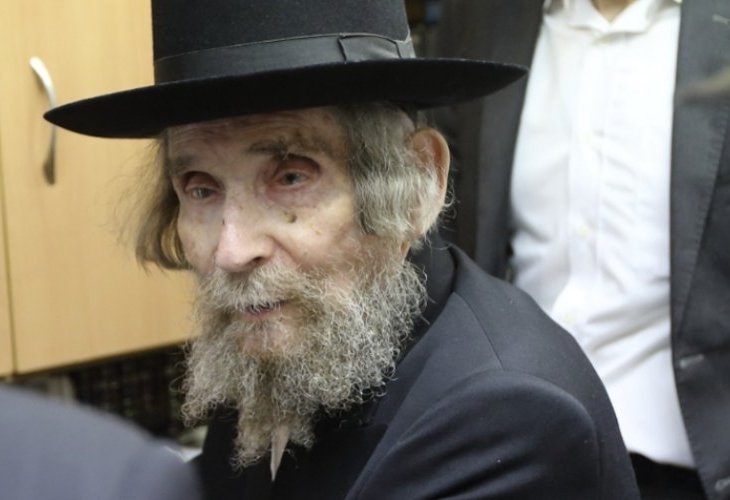Personal Stories
A Heart Full of Torah: Remembering Rabbi Steinman
His deep humility, love for others, and devotion to Torah inspired thousands—even those who never met him.
 Rabbi Steinman z"l (Photo: Flash 90)
Rabbi Steinman z"l (Photo: Flash 90)On a clear day, we were struck with heartbreaking news—the passing of our leader and teacher, Rabbi Aharon Yehuda Leib Steinman.
I stood among the crowds at his funeral, wondering quietly why hundreds of thousands of Jews had come—Chassidim, Litvaks, Sephardim. Many had never met him, never even seen him in person. Yet despite the fact that Rabbi Steinman had written in his will that just ten people would be enough for his funeral, the Jewish world came together as one to honor him.
Rescue services prepared, the police shut down the streets of Bnei Brak, and traffic was jammed in every direction. People waited for hours—some stood in line three hours just to catch a bus—yet they came, giving up even the time to light Chanukah candles. All this, simply to show honor to the Rosh Yeshiva they had never met, but deeply loved.
I remember him clearly. At the age of twelve and eleven months—an age when, in my father’s home, we began accepting the yoke of Torah and mitzvot (commandments)—we went to join the early morning prayers in the Rabbi’s home.
The house was tiny, just two and a half rooms. The ceiling was damp, the walls old and worn, badly in need of renovation. I turned to my father and asked, “Is this the honor of the Torah?”
My father answered me with a parable: A wealthy king once opened his palace to the townspeople, allowing them to take treasures for three hours. But along the way, the king’s servants set up stands with sweets and toys to distract people. The wise person kept walking, straight to the treasure. But the fool wasted all his time on candy and missed the real riches.
“That’s this world,” my father said. “The Rabbi understands that a fancy home and car are distractions. He knew that this world is just the corridor to the grand hall.”
After the prayers, I approached Rabbi Steinman and asked for a blessing, as I was preparing to begin living a life of Torah and mitzvot. The Rabbi lifted his eyes and looked at me, and I felt a tremor go through my body. I asked for a blessing “for everything.”
He blessed me to grow into a Torah scholar—with good character and yirat shamayim (a deep sense of connection and respect for Hashemfear of Heaven). I was surprised. Hadn’t I asked for a blessing for everything? But the Rabbi looked at me and said gently, “To be a Torah scholar—that is a blessing for everything.”
As we were leaving, his attendant leaned over and told me quietly, “You were just with a very great man.”
Until that painful Tuesday, I didn’t understand what truly made someone “great.” I knew people could be righteous, wise, or humble—but what did it mean to be a “great person”?
As I stood at the funeral among many Torah scholars, I asked the rabbi next to me. He answered, “A great person is someone who treats even the smallest things as important—washing hands before prayer, saying good morning with a smile. That’s greatness.”
And with that, I understood. True greatness is made up of all the small acts that shape a person’s life into something truly beautiful. That’s how it was with the Rosh Yeshiva. His character, his behavior—both the big things and the small—painted a picture of true greatness.
I had the privilege of learning in Rabbi Steinman’s yeshiva, Gaon Yaakov. There, we saw what self-sacrifice looked like up close. The Rabbi came to the yeshiva whenever he could, strengthening the students day and night.
Twice a week, he gave a Torah class in his home on various Talmudic topics. It was a huge effort for him, but he never canceled unless he was really ill. He never once said, “It’s too hard” or “I can’t today.” He always greeted us warmly—with a smile. That was the Rabbi: entirely devoted to others.
He would often say, “I don’t need anything—what about the other person?” That care for others was woven into the very fabric of who he was.
Even on Simchat Torah—a holiday filled with dancing and joy—he made every effort to be present with the yeshiva students. As the years passed and it became harder for him to walk, the students offered to carry him in a wheelchair.
He thought about it and said, “I’d rather not.” They asked why. He answered, “On Simchat Torah, everyone’s already tired from dancing. I’m worried a young man might lose sleep.”
That was his greatness: a heart that always thought of others.
For a man who cared about three things—Torah, yirat shamayim, and good middot (character traits)—it is a mitzvah, a true obligation, to honor him properly and remember his legacy.
—Rabbi Eliyahu Tzvi Goldschmid, Yeshivat Darchei Ish

